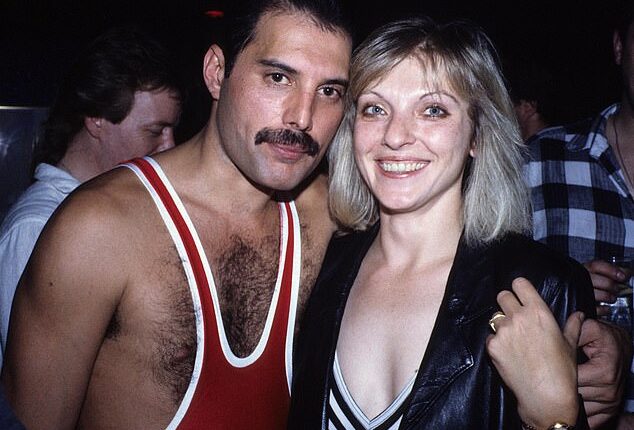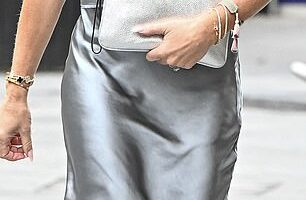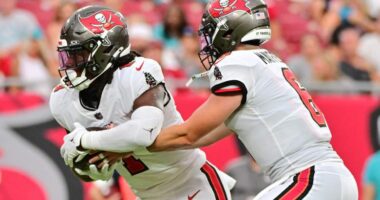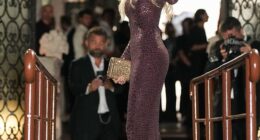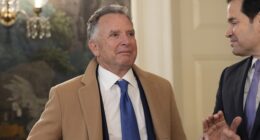‘I wanted to write to you for years,’ began the first of its 41 pages. ‘I hesitated a long time because Freddie wanted his privacy to remain private; because it’s still so hard and very painful; and because he would have been furious with me and would have hated that I do it.
‘But you are Freddie’s biographer. Because you did a great work in your last book about him, I think some facts should be brought to your attention about his childhood, his music, his polygamous bisexuality, and Freddie the private man.
‘You hear it here first, and you have the right to use it as you see fit. I ask for nothing in return… except the truth, for him.’
Little did I know that this email was the first of an avalanche of missives about Freddie that would land over the next three-and-a-half years, delivering a story so unlikely that at one point I questioned my sanity for believing it.
My correspondent later claimed to be Freddie’s secret daughter. And if what she said was to be believed, then for the entirety of his fame as Queen’s frontman, but unbeknown to his legions of adoring fans around the world, he was a devoted, hands-on dad.
Not only that, but Freddie has grandchildren. Raised on recordings of their grandfather reading bedtime stories to their mother when she was a little girl, it is the memory of their ‘Papy’ that they cherish, not the legend of a global rock superstar.
‘He hated that people saw only his outrageous side,’ she wrote. ‘It upset him terribly when people were attracted only to his fame and fortune, and would depict him as a superficial, arrogant and silly person when in reality he was quite the opposite. Underneath the outrageous character he was a very shy man with a great depth of heart and soul that only a handful of people knew.
‘I’m aware that I am contradicting myself by saying all this to you when he wanted his privacy. But he would probably have reached a point beyond which he could no longer tolerate lies and betrayals.

Freddie Mercury with his devoted ex-girlfriend Mary Austin at his 38th birthday party. Pictured after his Wembley Arena concert in 1985

The Queen frontman performing at Wembley Stadium during Live Aid, July 13, 1985

Freddie with his Queen bandmates Roger Taylor, Brian May and John Deacon
‘He would have exploded, because that was his way, and would at last have gone public with his own truth. I do think that he would have done it one day. It was only a matter of time.’
Was it a hoax? Were these the wild imaginings of some disgruntled troll or hater? Published authors are accustomed to receiving eccentric correspondence yet she claimed to have compelling evidence of her claims.
In one email, she referred to the small pigmentation on Freddie’s face, just below his left eye. This, she said, could not be seen in videos or in photos, in the bright light of day, under stage lights or on a film set. It went undetected by the camera’s flash.
‘You could only see it when you were so close to him that you were right in his face and he in yours, and only if he wasn’t made-up or too tanned. If I were not who I say I am, how would I know that about him?’
There were nights when I could barely sleep, so restless was I to receive her next message and over time we became close, establishing trust, a bond and a mutual understanding.
At the time of writing, we have known each other for more than three years. Because I have promised never to disclose her name, I will refer to her throughout as ‘B’.
I must state for the record that at no point did she offer me money to write Freddie’s true story, nor would I have accepted anything from her. I wish to emphasise that I have done so unbribed, uncompromised and completely of my own free will. She wishes to make clear she will make no money from either the sale of my book based on what she has told me or any subsequent adaptation of it.
At one point, she sent me a handwritten letter, to be published in the book – and written because of that in the third person – confirming our developing friendship. In it, she describes how I first met her in May 2023 when I flew to Montreux, the Swiss city where Queen had their own studio and where seven of their albums were crafted.
She bears a striking resemblance to her legendary parent, sharing his eyes, jaw, cheeks and nose, his hands, skin tone and hair texture. The likeness is utterly unmistakable.
‘I do not live there, but the city was chosen because of Freddie’s attachment to the place,’ she wrote. ‘Lesley-Ann made the journey to meet me and my family there; to see Freddie’s 17 notebooks, cards, private notes, letters, bank statements and other relevant documents; to view photos and private videos, and to listen to audio.

Biographer Lesley-Ann Jones, pictured, says that privacy was everything to Freddie – as proven by the fact that he was able to father a child and play an active part in her upbringing

‘Unbeknown to his legions of adoring fans around the world, he was a devoted and hands-on dad,’ says Lesley-Ann
‘She tried for a long time to persuade me to publish some of my photographs. It is by no means her fault that I decided not to agree to this. Although I understand very well the importance of illustrating a book, I had to decline to publish the records of our time together. They are from a father to his daughter and only child. They are records of my Dad and the grandfather of my children. We cherish them, they are private, and we want them to remain private.
‘None of these personal items will ever be exhibited to the public. Nor will they ever come up for auction. It is, however, my legal right to share everything I learned from my father’s notebooks. It is also my right to destroy the notebooks, should I ever see fit to do so.
‘Freddie’s fans, the lovers of his music and the millions who honour his memory must respect this. I hope and pray that they will. If they cannot, that will prove that I was right to keep our mementoes to myself.
‘The life I live with my husband and our family in another country is intensely private. We want things to stay that way. We cherish our peaceful and anonymous life, and we want nothing to disturb it. Nobody needs to know who I am.’
Privacy was everything to Freddie – as proven by the fact that he was able to father a child, play an active part in her upbringing, travel with her (although rarely on the same plane) and develop an intense, mutually fulfilling relationship with her while pretending to be a footloose and fancy-free millionaire rock star who belonged to no one and had zero responsibilities except to himself.
‘For Freddie, it was out of the question that a child should be exposed to public scrutiny,’ says B. ‘So he went to great lengths to protect me, adamant that life on the road and backstage culture was no place for a child.’
So close to his chest did he keep her that not even members of his own household knew anything about her. Only those who needed to know, those whom he trusted with his own life, ever knew the first thing. Had someone told them, the chances are that they would never have believed it.
It all seems extraordinary and far-fetched now. But reader, it happened and the evidence lies not least in the 17 notebooks she mentioned in her letter. Freddie gave these journals to her shortly before his death in November 1991, at the age of 45.

Freddie and Mary Austin pictured in their shared Kensington flat in 1977
‘Although Freddie writes that those who lived with him and shared his life knew of the existence of the notebooks, none of them knew, after his death, what had become of them,’ she says.
‘His family, fellow band members, closest friends, associates and management have had no idea until now that he gave them to me as a present.’
Four of the notebooks are bound in dark-blue cloth. The remaining 13 have full-grain stitched leather covers. Five are black, two dark blue, two saffron yellow, two red and two pine green. Their thick, horizontally lined paper pages have rounded corners.
Each book has 192 pages. Freddie used ballpoint or rollerball pens to write in them, sometimes in black ink, at other times blue.
Beginning in 1976, on hearing that he was to become a father, and making his last entry in July 1991, as his eyesight failed and his strength deserted him rapidly, he wrote more than half a million words in all.
They reveal, in at times excruciating detail, his innermost thoughts, memories and feelings about everything that he had experienced.
‘Freddie gave so few interviews that he was famous for it,’ wrote B. ‘Because of this it has been easy, since his death, for many people to exploit and betray him.
‘To twist his words, to rewrite his story, to speculate and make up this theory or that about his life, in order to equate him to the image of the Freddie Mercury that they seek to portray.
‘They have done this for their own profit and ego. Freddie would have been deeply wounded by it all. After more than three decades of lies, speculation and distortion, it is time to let Freddie speak.’
Writing her little messages and cards at the slightest opportunity, he called her ‘my dearest Trésor’ (French for treasure) and ‘my little Froggie’ (an allusion to frogs’ legs, a classic Gallic delicacy).
Her mother and Freddie’s paramour, his daughter reveals, was French. But who was she?
B’s life did not begin with some exquisitely romantic love story. It commenced, she confessed, with one of those moments they say are as old as time: an act of adultery.
Freddie, her mother and her mother’s husband had been close friends for years before her conception in the spring of 1976.
That April, Freddie had returned home from the Australian leg of Queen’s A Night At The Opera tour and was confronted by his boyfriend of the moment, David Minns, who was leaning on him to end his relationship with his fiancee Mary Austin to be with him.
‘Freddie was uneasy. He felt confused, and in need of moral support. My mother, meanwhile, had recently suffered a miscarriage and was feeling sad and depressed.
‘Her husband had gone away on business for two or three months. It was in this context that she and Freddie got together and wound up finding love and comfort in each other’s arms.
‘No test had to be taken because there was no doubt about paternity. The father could not have been my stepfather. He was simply not there.
‘My mother always blamed herself, for her ‘weakness’. She also blamed me. I was a black stain on her marriage and a daily visual reminder of the mistake she had made.’
But Freddie never saw their liaison as a mistake: ‘He did feel guilty, however. Not because of my birth: he was over the moon about becoming a dad and couldn’t have been more excited.
‘It was because I wasn’t going to be born into the perfect family set-up: mum, dad, siblings, pets, in a beautiful house with a garden. That was the kind of life he had always envisaged for himself and his children, should he ever be lucky enough to have any.’
His first journal entry was made on Sunday, June 20, 1976, two days after Queen released their single You’re My Best Friend from the album A Night at the Opera.
‘His life was complicated enough as it was at that time, thanks to the situation with my parents, his relationship with Mary, and a confusing, increasingly violent period with David Minns.
‘Now, to top the lot, an unplanned pregnancy and pending fatherhood. He put pen to paper to clear his head, unravel it all and try to work out how to proceed.’
For B’s Catholic mother, abortion was not an option, so Freddie sat down with her and her husband for ‘some stormy and difficult discussions before my birth. Thank goodness they were all intelligent enough to do things properly and peacefully.
‘I was born in February 1977 while Freddie was on tour in America. He was torn. He knew that he would be thousands of miles away on my mother’s due date, so he wouldn’t be able to see me for several weeks. He coped with that by recording his thoughts and feelings in his notebooks.’
Freddie first set eyes on his beautiful baby daughter in
mid-March 1977, after Queen returned to London.
There is video footage, says B, of father and child’s first encounter, the baby placed in Freddie’s arms by her nanny, Maria.
‘Once I was here and Freddie was officially a father, he wrote copiously in his journal about my development and the times that we spent together. He didn’t want to forget a single thing.’
The family appears to have managed a potentially explosive situation with care, compassion and discretion, despite the huge strain it must have placed on all of them.
‘It can’t have been easy for my stepfather to stay friends with a man who had slept with his wife during his absence, nor for him to accept their child with open arms. But he was a very resilient man, my stepfather. I so admired him.
‘They decided together to make the best of things, and to create an unconventional family: one with a mother, two fathers and what would eventually be an assortment of children, all of whom would be treated exactly the same.’
As her mother and stepfather moved around between England, Switzerland and the South of France in the coming years, Freddie always had a room at each of their homes, both to make things easier in terms of organisation and to ensure absolute discretion.

Freddie was known for his flamboyant stage persona (seen here on stage with Queen in 1975)
‘Had we tried to do all this while staying in hotels, we would all too soon have been spotted and exposed,’ explains B.
‘In effect, I had two fathers,’ she says. ‘I called Freddie ‘Dad’ and I addressed my stepfather as ‘Pa’.’
Freddie’s role and place in the triangle were never disputed. Nor was anything ever hidden from their daughter.
‘He never avoided my questions,’ she insists. ‘Not even the most sensitive ones. He always took into account my capacity to understand. I was slowly made aware of how things were.
‘Everything relating to my upbringing was discussed and agreed upon. Rules regarding what I should and shouldn’t be allowed to do at whatever age, conditions regarding phone calls between Freddie and me, where we should meet, where I would be taken on holiday and so on: everything about me and my life was decided by committee.
‘As were arrangements regarding how I should be protected. Which couldn’t always have been easy for them. But they deployed every possible subterfuge and strategy to prevent anyone who had nothing to do with it from making connections between us. And they succeeded.
‘Only those who needed to know of my existence were told about me. I was enrolled in schools where the teachers were accustomed to receiving the offspring of ‘celebrities’ and ‘personalities’, and who were well-versed in discretion regarding the families of their pupils and students.
‘Nevertheless, I had to change schools frequently, and not only when we moved house. It was all part of the plan to keep me secret. Though I have to say, I never felt hidden or that I was anything to be ashamed of. The opposite.
‘I was never made to feel like ‘the illegitimate one’, nor did I worry that anyone was ashamed of me.
‘I should never forget that he loved me, he would say. I was ‘the best thing he ever did in his life’, and ‘the greatest gift he had ever received’.’
She speaks at length and so fondly of a Freddie the world never knew. The Freddie who fed his baby in her highchair from a little pot with a spoon and with all the patience in the world, his face wreathed in delighted and loving smiles.
Of the Freddie who would sit for hours helping her with words when she was learning to read.
Of him making her say her recitations, of them painting with four hands and playing four-hand piano, building sandcastles, playing with the dolls’ house, staging pretend tea parties with teddies and a beautiful porcelain toy tea set.
Of sledding in the snow and decorating the snowman in winter, and playing together in the pool and in the garden during summer; of singing duets together, and dancing – ‘I don’t know who crushed whose feet more’; of mad moments flipping pancakes with their cats.
Of him letting her sleep peacefully in his arms in front of the many cartoons they used to watch; of the times he would help her to put on her shoes before taking her to the opera; and, after hour upon hour spent playing in the water, of him taking a brush and untangling her hair with infinite patience.
Left to their own devices, they were like any other father and daughter: walking and talking endlessly, playing spirited games of chess, or simply sitting together silently on the terraces of cafes, admiring the view and basking in the sun. They had all the time in the world, until it ran out on them.
One thing she clearly feels hard done by about is that Freddie was never once with her on Christmas Day, her stepfather insisting that the holidays should always be spent at the homes of grandparents.
‘Freddie made up for it by giving me memorable Christmases galore, that lasted from early December all the way into January.
‘We’d spend days reading lovely, traditional Christmas tales, which instilled in me a genuine passion for old books with wonderful illustrations and illuminations.
‘There would be dinners, concerts and other live performances; magical evenings spent singing Christmas carols and listening to other Christmas music, such as recordings by Frank Sinatra; and almost every day, there would be a delivery.
‘He was very good at spoiling his nearest and dearest and one of his favourite things to do was to buy several of the same item, whether it be a garment, a pen, a lighter, a vase, or even a piece of jewellery. He would purchase, say, ten of them, keep one for himself, and give the other nine away to his friends.
‘Of course, he spoiled me more than anyone else. After he gave me some cat figurines, I started to collect them. With his help, of course, because he couldn’t do anything the way ordinary people do.
‘He had to get me every single kind of cat, including soft toys and tiny trinkets, but also imposing bronze ones, delicate porcelain ones and even one made of Baccarat crystal.
‘It was the same when I started to collect tortoises, pandas and elephants. Thank God it never occurred to him to bring a live elephant home!’
At the piano, father and daughter would sometimes duet together on Queen songs.
‘We had our own special version of Let Me Entertain You,’ she reveals, but the songs of Freddie’s that she enjoys most are not exactly ‘songs’.
‘It’s what he recorded on tape, the drafts of songs, that please me most. They are my favourites because they take me back to when I’d be in the room with him, playing with something or reading a book while he worked at the piano. Sometimes on these tapes, while Freddie is playing, you hear this little four-year-old girl asking him to come and help her, or to play a few notes for her of this or that.
‘These tapes are very moving, and incredibly precious to me. Many were left at our home, and there they will remain for two important reasons.
‘Firstly, if he didn’t take them to work on further in the studio, it was because he considered them not good enough to develop. Secondly, because the only person who could judge, develop and complete his own ideas was Freddie himself.’
Contrary to the public image, Freddie was much more traditional than most might imagine. Mealtimes and dinners, for example, were extremely important to him, B affirms.
‘The setting of the dining table was a military operation, carried out with great care and ‘millimetre precision’. He actually used a ruler to line up the cutlery, crockery and glassware with their opposites on the other side of the table.
‘Once, when I was about seven years old and he had gone back to the kitchen to retrieve a missing piece, I wrecked his arrangement ever so slightly, then hid behind a cabinet to observe his reaction. It was the funniest thing. He was so horrified, he almost choked. I couldn’t help myself, I burst out laughing.
‘I then had to suffer several long minutes of his tickling, which was total torture because he was so good at it. When that was over, he ordered me to put the table arrangement back in order. With his help, of course.’
The very first time that B saw her father perform live on stage was in 1982, when Queen’s Hot Space tour reached Zurich.
‘At only five years old, I was used to watching Dad playing the piano and singing, so of course I already knew that he was a musician but I expected to see him walk out onto the stage looking very serious, wearing a dinner jacket and bow tie, and bowing to the audience.

Love, Freddie: Freddie Mercury’s Secret Life And Love by Lesley-Ann Jones is set to be published September 5
‘Instead there were big flashing lights, and the audience was really loud. And there he was gesticulating from one side of the stage to the other and shouting four-letter words!
‘He was never Freddie Mercury for me. At home, he was never anyone but Dad. The handkerchiefs, bath-robes, towels and dressing gowns that he kept at our home, and which I have to this day, are not embroidered with the initials ‘FM’. They are personalised simply with an ‘F’, or with ‘FB’. The ‘B’ being for ‘Bulsara’, his original surname.’
She would not trade their endless one-to-one discussions, she says, for anything in the world.
‘During periods when we couldn’t see each other, we had our daily evening phone calls almost without fail. I can think of only two or three occasions when the call couldn’t happen.
‘He was always so desperate not to miss it that sometimes, for example during Queen’s The Works tour in 1985 when they were travelling in Brazil, New Zealand, Australia and Japan, he would forget the time difference and call me when it was Europe’s middle of the night.
‘Whenever he was about to go away on tour, we would sit and examine a globe together so that I could see exactly where he was going. He’d also give me a map with his itinerary, so that I would always know where he was.
‘It was very easy to talk to my dad. He never raised his voice. He always encouraged me to speak openly to him about absolutely anything, and always to let everything out.
‘No topic was off limits. I could even use swear words if I felt the need. He never stopped me until everything was out in the open. At the end of the conversation, he might tell me that some of the words I’d used were inappropriate or that he didn’t want to hear them leave my mouth again.
‘Parenting came completely naturally to him. But he was also very strict.
‘School was extremely important, and I was required to take it seriously. I had a certain amount of freedom, but I had to do school homework before I could do anything else. I also had to get good marks. This was one of the things he was adamant about.
‘When I was 12, he forbade me to go to a Mötley Crüe concert with some older friends. I think he was freaked out that I was a fan of a band who would do, backstage, even more outrageous, scandalous and indecent things than he and Queen ever did.
‘When he found out that I had defied him, he was furious and gave me a look so stern it could have frozen your blood. He didn’t believe in physical punishment. But it was never necessary, because just that look of his was enough.
‘I am amazed now by how easy it was to talk to him, and by the fact that he never raised his voice. In that respect, he was so very far removed from the Big Star Mercury persona.
‘Because he had always told me that I could talk to him openly about absolutely anything, when I got my first ‘boyfriend’, the first thing I did was rush to tell my dad!
‘Oh, God,’ he moaned, ‘I wasn’t expecting that to happen so quickly!’ But as always, he was wonderful.
‘He wrote copiously in his journals about my development and the times that we spent together, and of how he needed me to know that he loved me unconditionally, and that I was always in his heart and at the forefront of his mind – even when we could not be together and could only talk on the phone.’
‘It was as though he was reliving his own childhood through me; should I say, the warm, loving, affectionate childhood he wished he had experienced himself.’
That childhood, it seems, was in many ways truly awful and in tomorrow’s Mail on Sunday I will reveal the terrible trauma he describes in his notebooks — incidents so horrific that they drove him to find escape in the music which would forever change his life.
- Adapted from Love, Freddie by Lesley-Ann Jones (Whitefox, £22.99), to be published 5 September. © Lesley-Ann Jones 2025. To order a copy go to www.mailshop.co.uk/books or call 020 3176 2937.
- Freddie Mercury: A Secret Daughter – Watch/stream on 5 from 9pm Saturday, September 6
Why did they get Dad’s eyes wrong in the film of his life?

Rami Malek as Freddie Mercury in the film Bohemian Rhapsody
B is less than complimentary about the controversial blockbuster film Bohemian Rhapsody, which Queen and their associates released in October 2018, 27 years after Freddie’s death.
It won four Oscars, a Golden Globe for Rami Malek for his portrayal of Freddie, and many other awards. Yet it fell short according to those in the know, not least B, who maintains that the ‘only truth in the picture is the soundtrack’.
The internet was full of people falling over themselves to chart the picture’s multiple mistakes and shortcuts. But for B, one of the most egregious errors lay in failing to use coloured contact lenses to change Rami Malek’s blue eyes to Freddie’s deep shade of brown.
‘The pale blue eyes were a bad mistake,’ she told me. ‘Freddie said so much with his eyes: his approval, his disapproval, his encouragement, his support. Joy, happiness, tenderness and, later on, some kind of melancholy.
‘His gaze had an incredible power. Whatever he wanted to express with it, no one could challenge it. Definitely not me.
‘And where is his sense of humour? His jokes? His funny games? His daily joy?
‘Freddie would have been appalled by the movie,’ was her conclusion. ‘It would have made his hair stand on end.’
